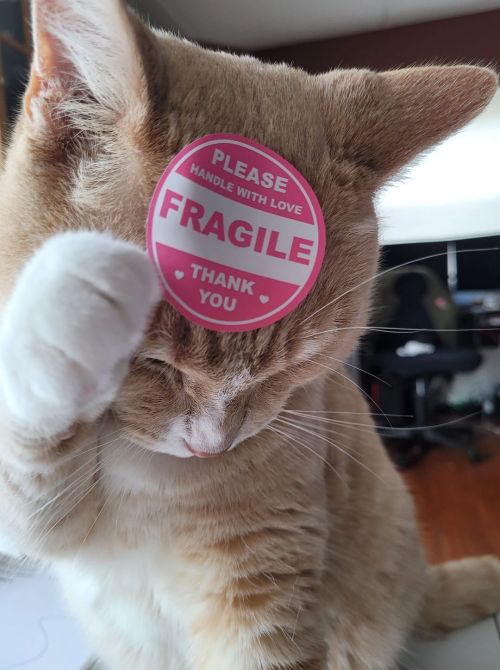Happy Spooky Season From Your Friendly Neighborhood Fire-lizard :D

Happy spooky season from your friendly neighborhood fire-lizard :D
More Posts from Wolfspoot and Others
This a a reminder to not fall victim to the sunk-cost fallacy. Just because you invested time and energy into something, does not mean you should indefinitely waste more time and energy on it, if you decide it’s not what you want anymore. This goes for anything, from books, to relationships, to jobs, to hobbies, etc.
If it’s not serving you anymore, move on.
Fun fact: in the 80′s the Dutch Unemployed Union held ‘fridge raids’ to protest against poverty.
They’d find out when a politician of big boss who upheld poverty and starvation wages was speaking at some public even, then they’d carefully break into his house with a LOT of people and they would eat EVERY piece of food in his house and leave the empty dished behind without taking anything else.

Ethiopian wolves feed on the sweet nectar of a local flower, picking up pollen on their snouts as they do so – which may make them the first carnivores discovered to act as pollinators.
The Ethiopian wolf (Canis simensis) is the rarest wild canid species in the world and Africa’s most threatened carnivore. Endemic to the Ethiopian Highlands, fewer than 500 individuals survive.
Sandra Lai at the University of Oxford and her colleagues observed wild Ethiopian wolves lapping up the nectar of Ethiopian red hot poker (Kniphofia foliosa) flowers. Local people in the mountains have traditionally used the nectar as a sweetener for coffee and on flat bread.
The wolves are thought to be the first large carnivore species ever to be recorded regularly feeding on nectar.
“For large carnivores, such as wolves, nectar-feeding is very unusual, due to the lack of physical adaptations, such as a long tongue or specialised snout, and because most flowers are too fragile or produce too little nectar to be interesting for large animals,” says Lai.
The sturdy, nectar-rich flower heads of the poker plant make this behaviour possible, she says. “To my knowledge, no other large carnivorous predator exhibits nectar-feeding, though some omnivorous bears may opportunistically forage for nectar, albeit rarely and poorly documented.”
Some of the wolves were seen visiting as many as 30 blooms in a single trip. As they lick the nectar, the wolves’ muzzles get covered in pollen, which they could potentially be transferring from flower to flower as they feed.
“The behaviour is interesting because it shows nectar-feeding and pollination by non-flying mammals might be more widespread than currently recognised, and that the ecological significance of these lesser-known pollinators might be more important than we think,” says Lai. “It’s very exciting.”
Lai and her colleagues at the Ethiopian Wolf Conservation Programme now hope to dig deeper into the behaviour and its ramifications. “Trying to confirm actual pollination by the wolves would be ideal, but that would be quite challenging,” she says. “I’m also very interested in the social learning aspect of the behaviour. We’ve seen this year adults bringing their juveniles to the flower fields, which could indicate cultural transmission.”
I'm trying to figure out a good way to say "you really should actually learn the basics of small talk" with sounding like I'm biased against autistic people.
-
 nachttraum liked this · 1 week ago
nachttraum liked this · 1 week ago -
 thorkidorki reblogged this · 1 week ago
thorkidorki reblogged this · 1 week ago -
 bunnyprismatic reblogged this · 3 weeks ago
bunnyprismatic reblogged this · 3 weeks ago -
 dragoncaller reblogged this · 3 weeks ago
dragoncaller reblogged this · 3 weeks ago -
 amalgrim reblogged this · 3 weeks ago
amalgrim reblogged this · 3 weeks ago -
 godofgrapes liked this · 3 weeks ago
godofgrapes liked this · 3 weeks ago -
 tarantasina liked this · 3 weeks ago
tarantasina liked this · 3 weeks ago -
 ocularskewer reblogged this · 4 weeks ago
ocularskewer reblogged this · 4 weeks ago -
 anauthorwhoknowsnothing reblogged this · 1 month ago
anauthorwhoknowsnothing reblogged this · 1 month ago -
 anauthorwhoknowsnothing liked this · 1 month ago
anauthorwhoknowsnothing liked this · 1 month ago -
 pumpkinspicethefaefox liked this · 1 month ago
pumpkinspicethefaefox liked this · 1 month ago -
 shani-t8 liked this · 1 month ago
shani-t8 liked this · 1 month ago -
 dusty-wings liked this · 1 month ago
dusty-wings liked this · 1 month ago -
 sheepheadfred reblogged this · 1 month ago
sheepheadfred reblogged this · 1 month ago -
 hexgirlssimp liked this · 1 month ago
hexgirlssimp liked this · 1 month ago -
 wannaliveattheholidayinn reblogged this · 1 month ago
wannaliveattheholidayinn reblogged this · 1 month ago -
 decepticupcake reblogged this · 1 month ago
decepticupcake reblogged this · 1 month ago -
 rikki-tiki-tavi reblogged this · 1 month ago
rikki-tiki-tavi reblogged this · 1 month ago -
 starwin72 liked this · 1 month ago
starwin72 liked this · 1 month ago -
 wheeljak liked this · 1 month ago
wheeljak liked this · 1 month ago -
 darkestelemental616 liked this · 1 month ago
darkestelemental616 liked this · 1 month ago -
 alruin liked this · 1 month ago
alruin liked this · 1 month ago -
 alruin reblogged this · 1 month ago
alruin reblogged this · 1 month ago -
 ghostlywastewonderland reblogged this · 1 month ago
ghostlywastewonderland reblogged this · 1 month ago -
 ghostlywastewonderland liked this · 1 month ago
ghostlywastewonderland liked this · 1 month ago -
 dr-jorbius liked this · 1 month ago
dr-jorbius liked this · 1 month ago -
 athenakeene liked this · 1 month ago
athenakeene liked this · 1 month ago -
 xobit reblogged this · 1 month ago
xobit reblogged this · 1 month ago -
 xobit liked this · 1 month ago
xobit liked this · 1 month ago -
 bitegore liked this · 1 month ago
bitegore liked this · 1 month ago -
 bitegore reblogged this · 1 month ago
bitegore reblogged this · 1 month ago -
 drkartofel liked this · 1 month ago
drkartofel liked this · 1 month ago -
 starlantern reblogged this · 1 month ago
starlantern reblogged this · 1 month ago -
 megmoon1111 liked this · 1 month ago
megmoon1111 liked this · 1 month ago -
 moon-times reblogged this · 1 month ago
moon-times reblogged this · 1 month ago -
 theflikchic liked this · 1 month ago
theflikchic liked this · 1 month ago -
 franticvampirereads liked this · 1 month ago
franticvampirereads liked this · 1 month ago -
 anomalie157 liked this · 1 month ago
anomalie157 liked this · 1 month ago -
 the-emerald-wyrm reblogged this · 1 month ago
the-emerald-wyrm reblogged this · 1 month ago -
 froggychan reblogged this · 2 months ago
froggychan reblogged this · 2 months ago -
 anonpumpkin reblogged this · 2 months ago
anonpumpkin reblogged this · 2 months ago -
 anonpumpkin liked this · 2 months ago
anonpumpkin liked this · 2 months ago -
 jdablokkhead reblogged this · 2 months ago
jdablokkhead reblogged this · 2 months ago -
 jdablokkhead liked this · 2 months ago
jdablokkhead liked this · 2 months ago -
 shadowycoffeealpaca reblogged this · 2 months ago
shadowycoffeealpaca reblogged this · 2 months ago -
 bluebirdieart liked this · 2 months ago
bluebirdieart liked this · 2 months ago -
 longsufferingangel reblogged this · 2 months ago
longsufferingangel reblogged this · 2 months ago -
 longsufferingangel liked this · 2 months ago
longsufferingangel liked this · 2 months ago
I’m a young-adult woman with the hopes of becoming a well-known writer. I’m a dreamer, a music lover and a chaotic human being, curious about what the future will bring but without any idea of what to do with it. As for this tumblr, we’ll see. I will make an attempt to make an interesting place but for now I still have to figure out what to do with it.
167 posts






